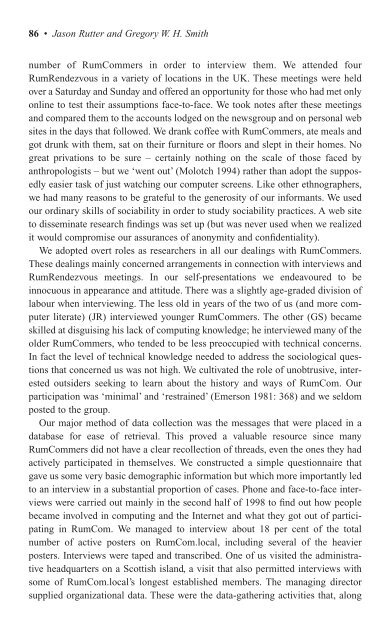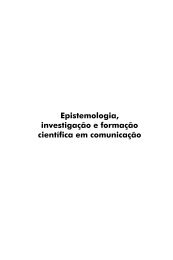Virtual Methods
Virtual Methods
Virtual Methods
You also want an ePaper? Increase the reach of your titles
YUMPU automatically turns print PDFs into web optimized ePapers that Google loves.
86 • Jason Rutter and Gregory W. H. Smith<br />
number of RumCommers in order to interview them. We attended four<br />
RumRendezvous in a variety of locations in the UK. These meetings were held<br />
over a Saturday and Sunday and offered an opportunity for those who had met only<br />
online to test their assumptions face-to-face. We took notes after these meetings<br />
and compared them to the accounts lodged on the newsgroup and on personal web<br />
sites in the days that followed. We drank coffee with RumCommers, ate meals and<br />
got drunk with them, sat on their furniture or floors and slept in their homes. No<br />
great privations to be sure – certainly nothing on the scale of those faced by<br />
anthropologists – but we ‘went out’ (Molotch 1994) rather than adopt the supposedly<br />
easier task of just watching our computer screens. Like other ethnographers,<br />
we had many reasons to be grateful to the generosity of our informants. We used<br />
our ordinary skills of sociability in order to study sociability practices. A web site<br />
to disseminate research findings was set up (but was never used when we realized<br />
it would compromise our assurances of anonymity and confidentiality).<br />
We adopted overt roles as researchers in all our dealings with RumCommers.<br />
These dealings mainly concerned arrangements in connection with interviews and<br />
RumRendezvous meetings. In our self-presentations we endeavoured to be<br />
innocuous in appearance and attitude. There was a slightly age-graded division of<br />
labour when interviewing. The less old in years of the two of us (and more computer<br />
literate) (JR) interviewed younger RumCommers. The other (GS) became<br />
skilled at disguising his lack of computing knowledge; he interviewed many of the<br />
older RumCommers, who tended to be less preoccupied with technical concerns.<br />
In fact the level of technical knowledge needed to address the sociological questions<br />
that concerned us was not high. We cultivated the role of unobtrusive, interested<br />
outsiders seeking to learn about the history and ways of RumCom. Our<br />
participation was ‘minimal’ and ‘restrained’ (Emerson 1981: 368) and we seldom<br />
posted to the group.<br />
Our major method of data collection was the messages that were placed in a<br />
database for ease of retrieval. This proved a valuable resource since many<br />
RumCommers did not have a clear recollection of threads, even the ones they had<br />
actively participated in themselves. We constructed a simple questionnaire that<br />
gave us some very basic demographic information but which more importantly led<br />
to an interview in a substantial proportion of cases. Phone and face-to-face interviews<br />
were carried out mainly in the second half of 1998 to find out how people<br />
became involved in computing and the Internet and what they got out of participating<br />
in RumCom. We managed to interview about 18 per cent of the total<br />
number of active posters on RumCom.local, including several of the heavier<br />
posters. Interviews were taped and transcribed. One of us visited the administrative<br />
headquarters on a Scottish island, a visit that also permitted interviews with<br />
some of RumCom.local’s longest established members. The managing director<br />
supplied organizational data. These were the data-gathering activities that, along



